(完整版)裕兴新概念第一册笔记(115-116)
裕兴新概念英语第一册笔记(完整版)
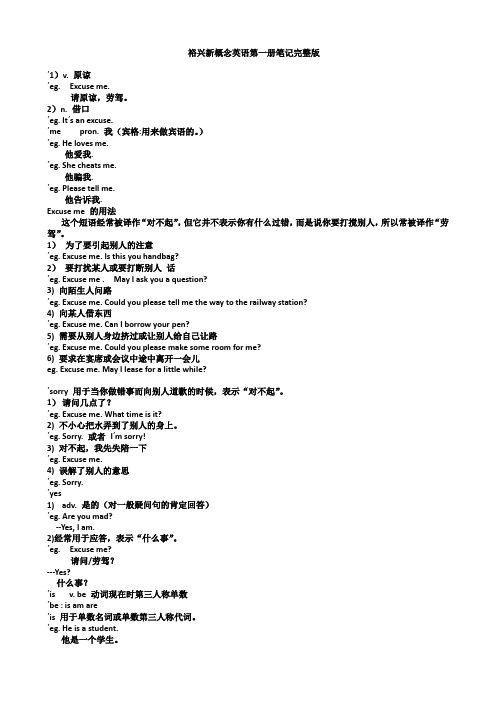
裕兴新概念英语第一册笔记完整版΄1)v. 原谅΄eg. Excuse me.请原谅,劳驾。
2)n. 借口΄eg. It΄s an excuse.΄me pron. 我(宾格:用来做宾语的。
)΄eg. He loves me.他爱我.΄eg. She cheats me.他骗我.΄eg. Please tell me.他告诉我.Excuse me 的用法这个短语经常被译作“对不起”,但它并不表示你有什么过错,而是说你要打搅别人,所以常被译作“劳驾”。
1)为了要引起别人的注意΄eg. Excuse me. Is this you handbag?2)要打扰某人或要打断别人话΄eg. Excuse me . May I ask you a question?3) 向陌生人问路΄eg. Excuse me. Could you please tell me the way to the railway station?4) 向某人借东西΄eg. Excuse me. Can I borrow your pen?5) 需要从别人身边挤过或让别人给自己让路΄eg. Excuse me. Could you please make some room for me?6) 要求在宴席或会议中途中离开一会儿eg. Excuse me. May I lease for a little while?΄sorry 用于当你做错事而向别人道歉的时候,表示“对不起”。
1)请问几点了?΄eg. Excuse me. What time is it?2) 不小心把水弄到了别人的身上。
΄eg. Sorry. 或者I΄m sorry!3) 对不起,我先失陪一下΄eg. Excuse me.4) 误解了别人的意思΄eg. Sorry.΄yes1)adv. 是的(对一般疑问句的肯定回答)΄eg. Are you mad?--Yes, I am.2)经常用于应答,表示“什么事”。
新概念英语第一册课文翻译及学习笔记Lesson111~116
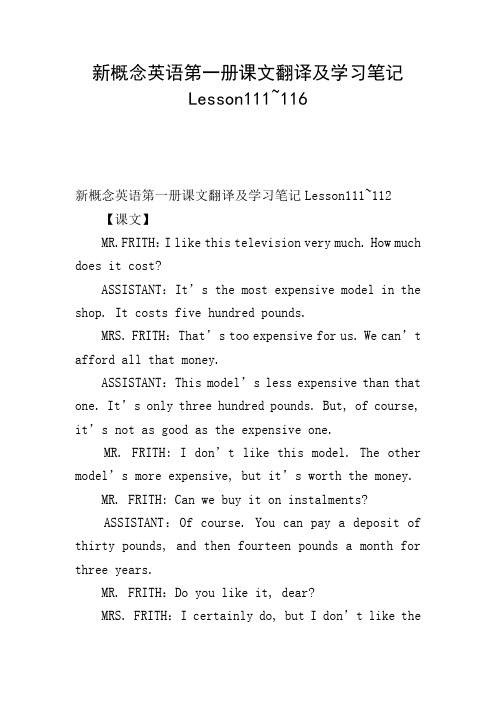
新概念英语第一册课文翻译及学习笔记Lesson111~116新概念英语第一册课文翻译及学习笔记Lesson111~112 【课文】MR.FRITH:I like this television very much. How much does it cost?ASSISTANT:It’s the most expensive model in the shop. It costs five hundred pounds.MRS. FRITH:That’s too expensive for us. We can’t afford all that money.ASSISTANT:This model’s less expensive than that one. It’s only three hundred pounds. But, of course, it’s not as good as the expensive one.MR. FRITH: I don’t like this model. The other model’s more expensive, but it’s worth the money.MR. FRITH: Can we buy it on instalments?ASSISTANT:Of course. You can pay a deposit of thirty pounds, and then fourteen pounds a month for three years.MR. FRITH:Do you like it, dear?MRS. FRITH:I certainly do, but I don’t like theprice. You always want the best, but we can’t afford it. Sometimes you think you’re a millionaire!MR.FRITH:Millionaires don’t buy things on instalments!【课文翻译】弗里斯先生:我非常喜欢这台电视机。
新概念课堂笔记 第一册 Lesson 115-116
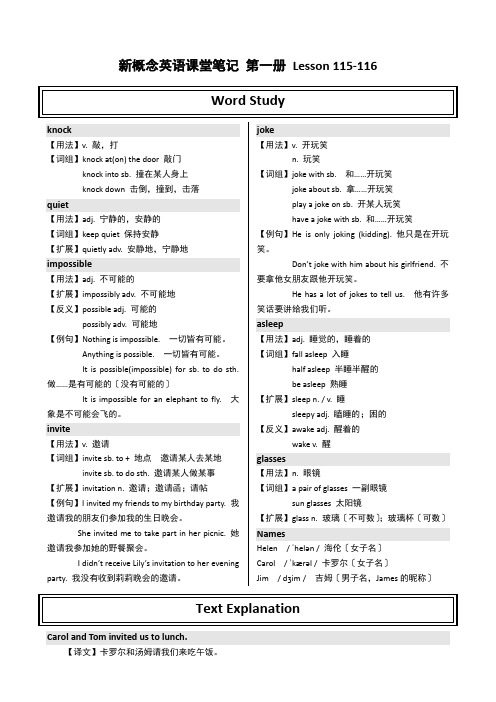
新概念英语课堂笔记第一册Lesson 115-116knock【用法】v. 敲,打【词组】knock at(on) the door 敲门knock into sb. 撞在某人身上knock down 击倒,撞到,击落quiet【用法】adj. 宁静的,安静的【词组】keep quiet 保持安静【扩展】quietly adv. 安静地,宁静地impossible【用法】adj. 不可能的【扩展】impossibly adv. 不可能地【反义】possible adj. 可能的possibly adv. 可能地【例句】Nothing is impossible. 一切皆有可能。
Anything is possible. 一切皆有可能。
It is possible(impossible) for sb. to do sth. 做……是有可能的〔没有可能的〕It is impossible for an elephant to fly. 大象是不可能会飞的。
invite【用法】v. 邀请【词组】invite sb. to + 地点邀请某人去某地invite sb. to do sth. 邀请某人做某事【扩展】invitation n. 邀请;邀请函;请帖【例句】I invited my friends to my birthday party. 我邀请我的朋友们参加我的生日晚会。
She invited me to take part in her picnic. 她邀请我参加她的野餐聚会。
I didn’t receive Lily’s invitation to her evening party. 我没有收到莉莉晚会的邀请。
joke【用法】v. 开玩笑n. 玩笑【词组】joke with sb. 和……开玩笑joke about sb. 拿……开玩笑play a joke on sb. 开某人玩笑have a joke with sb. 和……开玩笑【例句】He is only joking (kidding). 他只是在开玩笑。
新概念115-116课
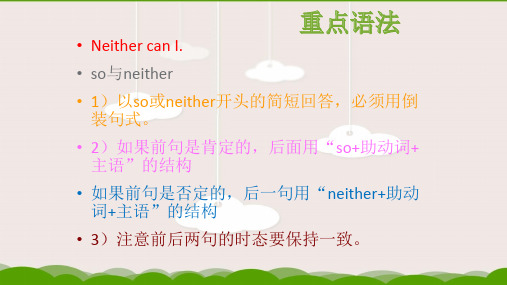
Nothing interesting
be nothing to 对...不算什么,毫无关系 have nothing to do with ... 与...毫无关系
★joke [dʒəuk]
1.v. 开玩笑 She is only joking with you.
2. n. 玩笑
He sometimes tells jokes.
反义词:possible impatient; polite
❤ impossible adj. 不可能的,办不到的
反义词:possible That’s impossible. 那是不可能的。 It is possible for sb. to do sth. It is possible for me to pass this exam. It is impossible for sb. to do sth It is impossible for sb to do… 做….是不可能的 在这样的下雨天是不可能搭到出租车的。 It is impossible to get a taxi on such a rainy day. 要 他解决 那个问题是不可能的。 It’s impossible. It was impossible for him to solve the problem. Anything is possible.
n. invitation a letter of invitation
anything pron. 任何东西
(疑问句,否定句)任何事 物,任何东西都不
你说了些什么吗?
Did you say anything?
anything important ?
新概念英语-第一册-第115-116课 Knock, knock!

3.I'm so thirsty.Shall we get_s_o_m_e_t_h_in_g__to drink? 4.I don't think_a_n_y_o_n_e__knows her new address.
5.There's __n_o_th_i_n_g_in the new cupboard. It's empty now. 6._N__o_th_in_g___is too difficult if you put your heart into it. 7.I think you can find him _n_ow__h_er_e_\_s_o_m_e_w_h_e_r_ein the school. 8._N_o_b_o_dy___can run fast than he. He 's the winner. 9.Could you tell_a_n_y_th_i_n_g___different btween the two
②安详的,安定的
③(人,性格)稳重的, 寡言的
一个寡言的孩子 a quiet child
impossible [im'pɔsəbl] adj.
不可能的
那是不可能的。 That’s impossible. 对某人来说做某事是不可能的
It is impossible for sb. to do sth.
pictures?
10.Please help yourself to_s_o_m_e_____soup.
It’s your turn
A1..Wsoomueld,yaonuylike__s_o_m_e__more? 2.There are some apples on the table. You can take__s_o_m_e__of them.
裕兴新概念英语第一册笔记(完整版)
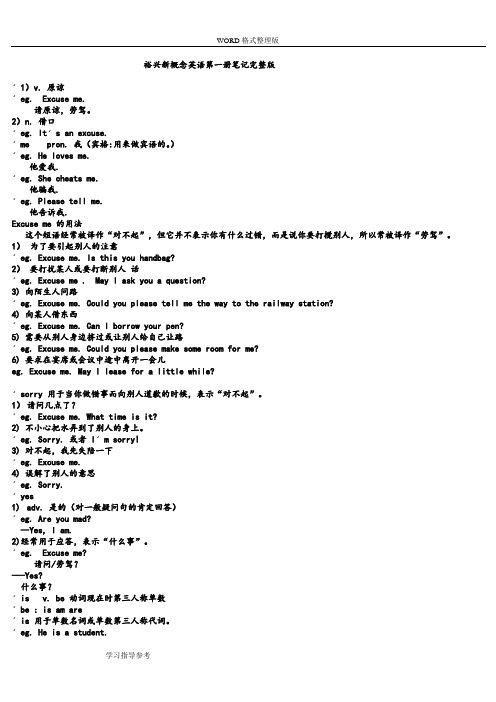
裕兴新概念英语第一册笔记完整版΄1)v. 原谅΄eg. Excuse me.请原谅,劳驾。
2)n. 借口΄eg. It΄s an excuse.΄me pron. 我(宾格:用来做宾语的。
)΄eg. He loves me.他爱我.΄eg. She cheats me.他骗我.΄eg. Please tell me.他告诉我.Excuse me 的用法这个短语经常被译作“对不起”,但它并不表示你有什么过错,而是说你要打搅别人,所以常被译作“劳驾”。
1)为了要引起别人的注意΄eg. Excuse me. Is this you handbag?2)要打扰某人或要打断别人话΄eg. Excuse me . May I ask you a question?3) 向陌生人问路΄eg. Excuse me. Could you please tell me the way to the railway station?4) 向某人借东西΄eg. Excuse me. Can I borrow your pen?5) 需要从别人身边挤过或让别人给自己让路΄eg. Excuse me. Could you please make some room for me?6) 要求在宴席或会议中途中离开一会儿eg. Excuse me. May I lease for a little while?΄sorry 用于当你做错事而向别人道歉的时候,表示“对不起”。
1)请问几点了?΄eg. Excuse me. What time is it?2) 不小心把水弄到了别人的身上。
΄eg. Sorry. 或者 I΄m sorry!3) 对不起,我先失陪一下΄eg. Excuse me.4) 误解了别人的意思΄eg. Sorry.΄yes1)adv. 是的(对一般疑问句的肯定回答)΄eg. Are you mad?--Yes, I am.2)经常用于应答,表示“什么事”。
新概念英语第一册Lesson-115-116知识分享
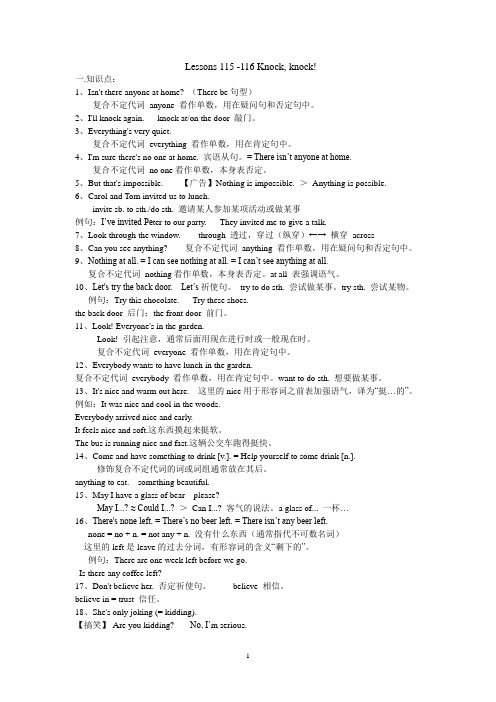
Lessons 115 -116 Knock, knock!一.知识点:1、Isn't there anyone at home? (There be句型)复合不定代词anyone 看作单数,用在疑问句和否定句中。
2、I'll knock again. knock at/on the door 敲门。
3、Everything's very quiet.复合不定代词everything 看作单数,用在肯定句中。
4、I'm sure there's no one at home. 宾语从句。
= There isn’t anyone at home.复合不定代词no one看作单数,本身表否定。
5、But that's impossible. 【广告】Nothing is impossible. >Anything is possible.6、Carol and Tom invited us to lunch.invite sb. to sth./do sth. 邀请某人参加某项活动或做某事例句:I’ve invited Pe ter to our party. They invited me to give a talk.7、Look through the window. through 透过,穿过(纵穿)←→ 横穿across8、Can you see anything? 复合不定代词anything 看作单数,用在疑问句和否定句中。
9、Nothing at all. = I can see nothing at all. = I can’t see anything at all.复合不定代词nothing看作单数,本身表否定。
at all 表强调语气。
10、Let's try the back door. Let’s祈使句。
try to do sth. 尝试做某事。
新概念英语第一册第115-116课重点语法
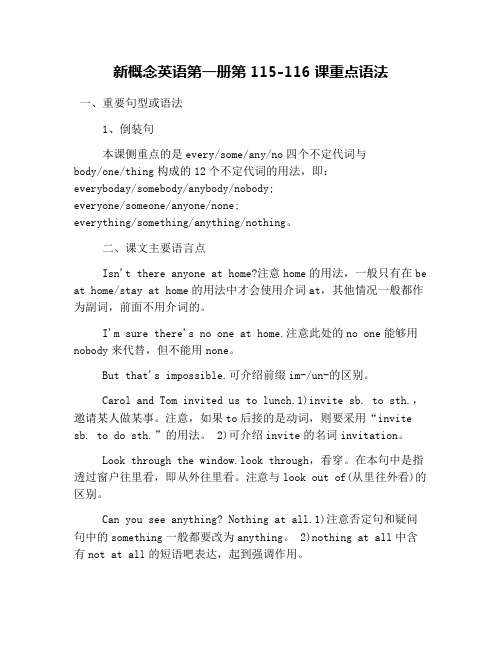
新概念英语第一册第115-116课重点语法一、重要句型或语法1、倒装句本课侧重点的是every/some/any/no四个不定代词与body/one/thing构成的12个不定代词的用法,即:everyboday/somebody/anybody/nobody;everyone/someone/anyone/none;everything/something/anything/nothing。
二、课文主要语言点Isn't there anyone at home?注意home的用法,一般只有在be at home/stay at home的用法中才会使用介词at,其他情况一般都作为副词,前面不用介词的。
I'm sure there's no one at home.注意此处的no one能够用nobody来代替,但不能用none。
But that's impossible.可介绍前缀im-/un-的区别。
Carol and Tom invited us to lunch.1)invite sb. to sth.,邀请某人做某事。
注意,如果to后接的是动词,则要采用“invite sb. to do sth.”的用法。
2)可介绍invite的名词invitation。
Look through the window.look through,看穿。
在本句中是指透过窗户往里看,即从外往里看。
注意与look out of(从里往外看)的区别。
Can you see anything? Nothing at all.1)注意否定句和疑问句中的something一般都要改为anything。
2)nothing at all中含有not at all的短语吧表达,起到强调作用。
Let's try the back door.1)Let's do...,祈使句。
- 1、下载文档前请自行甄别文档内容的完整性,平台不提供额外的编辑、内容补充、找答案等附加服务。
- 2、"仅部分预览"的文档,不可在线预览部分如存在完整性等问题,可反馈申请退款(可完整预览的文档不适用该条件!)。
- 3、如文档侵犯您的权益,请联系客服反馈,我们会尽快为您处理(人工客服工作时间:9:00-18:30)。
Lesson 115 Knock, Knock! 敲,敲门New Words and expressions 生词和短语anyone pron. 任何人knock v. 敲,打everything pron. 一切事物quiet adj. 宁静的,安静的impossible adj. 不可能的invite v. 邀请anything pron. 任何东西nothing pron. 什么也没有lemonade n. 柠檬水joke v. 开玩笑anyone pron. 意义和用法与anybody相同,但anybody比较“口语“化。
1)(用于疑问句,if 从句)任何人,(用于否定句)任何人都不eg. Is anyone there?有谁在那里吗?You should not rely on anyone.你不应该依赖任何人。
2)(用于肯定句)无论谁eg. Anyone may attend his lecture.任何人都可以听他演讲。
knock1) 敲,打eg. I knocked at the door, but there was no answer.我敲了门,但没有回应。
He came in without knocking.他没有敲门就近来了2)用力打,揍eg. He knocked me on the head.他打我的头。
3)以…碰撞…,碰撞eg. He knocked his leg against the desk.他的腿撞到了那张书桌。
The man knocked against me on purpose。
那个人故意撞我。
knock down 把(人)击倒,(车等)撞倒(人)eg. His son was knocked down by a car.他的儿子被汽车撞倒knock it off (口语)住手,住嘴everything pron. 一切事物,每样事物eg. Everything is good well.万事如意。
Tell me everything about it.告诉我整个事情的来龙去脉。
用法:1)修饰everything的形容词置于everything之后。
everything useful 一切有用的东西2) 最重要的东西eg. Money is everything to him.钱对他而言是最重要的东西She is everything to me.她是我的一切。
3)and everything adv. 以及其他,等等=and so on eg. They bought a table,chairs and everything.他们买了桌子,椅子以及其他种种东西。
quiet1) 宁静的,安静的a quiet night 寂静之夜a quiet room 安静的房间in a quiet voice 很小声地2)安祥的,安定的eg. I'd(would) like to live a quiet life in the country.我想到乡下过悠闲的生活,。
live a …life 过着…的生活in the country 在乡下3) (人,性格等)稳重的,寡言的a quiet child 温顺的孩子quiet manners 稳重的态度impossible adj. 不可能的,办不到的反义词:possiblean impossible plan 不可能实行的计划eg. It is impossible to get a taxi on such a rainy day.在这样的下雨天是不可能搭到出租车的。
It was impossible for him to solve the problem.要他解决那个问题是不可能的。
用法:1)以人或事为主语时,impossible不能做表语与不定式连用必须用it作形式主语。
eg. It is impossible for him to do it.要他做那件事是不可能的。
He is impossible to do it. (错误)2)it 也可不做主语,而做宾语。
eg. Illness made it impossible for him to go.=Illness made him impossible to go.生病使他不能去。
invite v. 邀请invite sb to …. 邀请某人到…eg. He invited them to the party.他邀请他们参加宴会。
invite sb to do 邀请某人做…eg. I invited her to have coffee.我邀请她喝咖啡。
invitation n. 邀请,引诱a letter of invitation 邀请函accept the invitation to the wedding. 接受邀请参加婚礼。
anything pron. 任何东西(用于疑问句,if从句)任何事物(用于否定句) 任何东西都(不)eg. Did you say anything?你说了些什么吗?Has anything happened during my absence?我不在时发生了什么事吗?Do you want anything to drink?你想喝点什么?If there's anything I can do for you, please tell me.如果有什么我能帮你的,请告诉我。
I didn't eat anything today.= I eat nothing today.我今天什么也没吃。
用法:1)用于疑问句,否定句,if (weather)从句,肯定句用something.2)修饰anything 的形容词置于其后。
nothing pron. 什么也没有。
eg. He said nothing about it.那件事他什么也没说。
There is nothing wrong with the engine.那引擎没有什么毛病。
Nothing could change his mind.没有任何事能改变他的心意。
修饰nothing的形容词要置于其后。
nothing interesting 没有什么有趣的事情be nothing to 对…不算什么,毫无关系eg. Both money and honor were nothing to him.金钱和名誉两者对他都不重要。
have nothing to do with 与…毫无关系eg. The man had nothing to do with the bank robbery.这个人与银行抢动案毫无关系。
lemonade n. 柠檬水lemon n. 柠檬joke v. 开玩笑,戏弄,嘲弄eg. My brother is always joking.我的兄弟经常开玩笑You must be joking.你在开玩笑吧I joked with him.我和他开玩笑joke n. 玩笑eg. He sometimes tells jokes.他有时会说笑话。
He can't take a joke .他经不起开玩笑。
It's no joke.不是开玩笑。
make a joke 开玩笑, 说笑话。
a stale joke 听厌了的笑话GRAMMAR 语法不定代词一、英语中不定代词有下列三种:普通不定代词,个体代词,数量代词。
1. 普通不定代词1)some/ any / no2)somebody / anybody / nobodysomeone / anyone/ no onesomething/ anything / nothing3)one/ none2. 个体代词1)all/ both/ each/ half/ every/ other/ another/ either/ neither/2)everybody/ everyone/ everything3. 数量代词many/ much/ few/ little/ a few/ a little/ a lot of/ lots of 二、不定代词一般既可指人,也可指物,但其中由-body和-one构成的复合代词只能指人,由-ing构成的复合代词以及修饰不可数名词的much和(a)little只能指物eg. There is much to do.要做很多事情。
Someone will pay the bill.有人会付账单的。
Can you do everything carefully?你可不可做事认真一点?三、大多数不定代词都可以代替名词或形容词,在句中作主语,宾语,定语和表语。
1)no, every 只有形容词功能,作定语;2) none, others 及所有的合成代词只有名词的功能不能作定语。
3)all, both, each还可以作同位语--作主语eg. Everyone is out.大家都出去了。
Everything is ready.一切都准备好了。
Nobody tells me about it.没有人告诉我有关这件事的情况。
--作宾语eg. I’ve got nothing to eat.我没有什么可以吃了。
I’ve seen nothing.我没看到什么东西I saw no one.我谁也没有看到。
--作表语eg. There’s nothing on the shelf.架子上什么也没有。
There’s something in the room.房间里有个人。
That’s nothing.那没什么。
--与some和any的用法一样1)somebody/someone/something/somewhere 一般用于肯定句2) anybody/anyone/anything/anywhere 用于疑问句与否定句3)nothing/ nobody/ no one/ nowhere 相当于not~anything/not ~anybody/not ~anyone/not~anywhere eg. Someone is asking to see you.有人要求见你。
There’s something in the box!盒子里有个什么东西Is there anything to drink?有什么喝的东西吗?I went nowhere.=I did n’t go anywhere我哪也没去。
I saw no one.= I did n’t see anyone.我没看到任何人.Exit [课文]Question: Jim has to drink some lemonade instead of beer, hasn’t he?Jim 只有一些柠檬水可以喝,而没有啤酒喝,是吗?HELEN: Isn't there anyone at home?JIM: I'll knock again, Helen.Everything's very quiet.I'm sure there's no one at home.HELEN: But that's impossible.Carol and Tom invited us to lunch.Look through the window.HELEN: Can you see anything?JIM: Nothing at all.HELEN: Let's try the back door.JIM: Look! Everyone's in the garden.CAROL: Hello, Helen. Hello, Jim.TOM: Everybody wants to have lunch in the garden.It's nice and warm out here.CAROL: Come and have something to drink.JIM: Thanks, Carol.May I have a glass of beer please?CAROL: Beer? There's none left.You can have some lemonade.JIM: Lemonade!TOM: Don't believe her, Jim.She's only joking. Have some beer!课文讲解:A: Isn’t there anyone at home?家里没有人吗?Isn’t there....是个否定疑问句,表示奇怪,不满等情绪.eg. Isn’t there any milk in the glass?玻璃杯中没有什么牛奶吗?Haven’t you been to the Great Wall?你没去过长城吗?anyone是不定代词,是由any和one组成的复合代词,谓语用单数形式。
